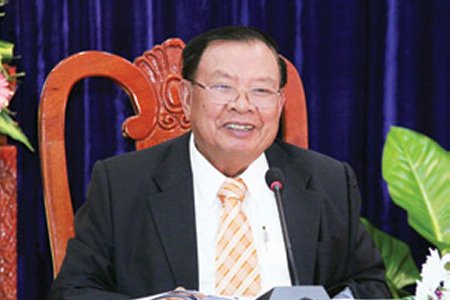
Vice President Bounnhang Vorachit said recently that many Lao officials are violating the country’s laws and abusing their power of authority to embezzle state property, causing great loss to the nation.
Mr Bounnhang made the observation at the annual inspection meeting which was attended by officials from across the country. The meeting came to an end on Friday.
The vice president highlighted that this issue needs to be urgently addressed in order to ensure the country’s development progress can move forwards in a quicker manner.
He said:
- illegal logging and illegal mining excavation occurs with the involvement of state officials, leading to financial leaks and hindering national development.
- Official corruption, extravagance and abuse of power remain issues of great concern in Laos.
- there are some loopholes which offer tariff exemptions for some development projects, resulting in the state losing large sums of money which should go to the national budget.
- that poverty reduction and the promotion of commercial production in some areas did not realise the set objectives. In some areas, there were no projects and no detailed approach to promoting increased production.
- In many regions, authorities operated development projects without the approval of the National Assembly. This kind of practice has resulted in more debts for the country and imposed future financial burdens.
- that social problems are on rise in Laos including crimes and drug trafficking.
The vice president urged inspection authorities to work harder to expose the illegal activities as well as the officials’ corruption.
Mr Bounnhang called for inspectors
- to inspect infrastructure development projects from their inception as a way to ensure the effective use of the budget and prevent officials from engaging in corr uption.
- to concentrate more on inspecting the forestry sector, notably the export of timber because in the past years, large quantities of Lao timber were illegally exported and the government lost a lot of revenue as a result.
- to inspect the collection of revenue from land use and concessions after the government failed to collect sufficient revenue from this sector.According to the Government Inspection Authority, corruption is highly undesirable and hinders the development of individual nations and the global economy.
Corruption damages governments, the regulatory structure, and societal behaviour. The legal authority of ministries is diminished, economic growth is slowed, poverty eradication is negatively affected, and disputes arise, many involving trade.
“If these issues continue, it could affect the leadership of our Party,” he said. Mr Bounnhang called for officials to act as a good model for the young generation as corrupt officials could damage the image of the Party’s leadership.
Souce: Vientiane Times

